

FSCONS: YaCy Demo. Who uses Tor? Tor was originally designed, implemented, and deployed as a third-generation onion routing project of the Naval Research Laboratory.
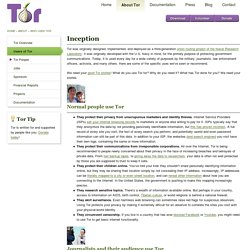
It was originally developed with the U.S. Navy in mind, for the primary purpose of protecting government communications. Today, it is used every day for a wide variety of purposes by the military, journalists, law enforcement officers, activists, and many others. Here are some of the specific uses we've seen or recommend. We need your good Tor stories! Normal people use Tor They protect their privacy from unscrupulous marketers and identity thieves. Journalists and their audience use Tor Reporters without Borders tracks Internet prisoners of conscience and jailed or harmed journalists all over the world. Law enforcement officers use Tor Online surveillance: Tor allows officials to surf questionable web sites and services without leaving tell-tale tracks.
Activists & Whistleblowers use Tor High & low profile people use Tor Business executives use Tor Tor Tip. Netsukuku - Dyne.org Wiki. Netsukuku Community. What is Netsukuku?
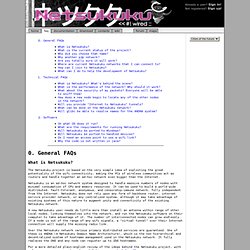
The Netsukuku project is based on the very simple idea of exploiting the great potentiality of the wifi connectivity, making the PCs of wireless communities act as routers and handle together an ad-hoc network even bigger than the Internet. Netsukuku is an ad-hoc network system designed to handle massive numbers of nodes with minimal consumption of CPU and memory resources. It can be used to build a world-wide distributed, fault-tolerant, anonymous, and censorship-immune network, fully independent from the Internet.
Netsukuku does not rely upon any form of backbone router, internet service provider network, or any centralized system, although it may take advantage of existing systems of this nature to augment unity and connectivity of the existing Netsukuku network. Over the Netsukuku network various primary distributed services are guaranteed. The Alternative P2P Wireless Internet Network: The Netsukuku Idea. Netsukuku: Fractal Address System For a P2P Cloud by Sepp Hasslberger What Is Netsukuku The February 2010 issue of Wired Magazine in Italian runs a cover story on Netsukuku, a fractal address system for a cloud of user maintained, linked computers forming a p2p network.
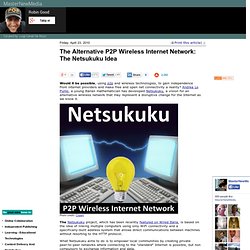
The Netsukuku project is based on the idea of exploiting the potential of WiFi connectivity, linking the PCs of wireless communities to act as routers, forming a network that could become as large or larger than the current Internet. Netsukuku is an ad-hoc network forming software built around an address system designed to handle massive numbers of nodes while requiring minimal CPU and memory resources. It could be used to build a world-wide distributed, fault-tolerant, anonymous, and censorship-resistant network, fully independent of the Internet. The number of interconnected nodes can grow almost infinitely. Here is a summary, freely adapted from the Italian Wired article: Netsukuku. Basic idea[edit] Netsukuku aims to build a fully distributed network that does not rely on single points of failure as the actual Internet.
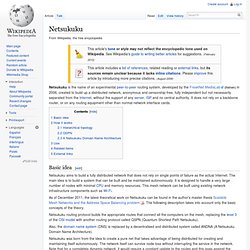
The main idea is to build a system that can be built and be maintained autonomously. It is designed to handle a very large number of nodes with minimal CPU and memory resources. This mesh network can be built using existing network infrastructure components such as Wi-Fi. As of December 2011, the latest theoretical work on Netsukuku can be found in the author's master thesis Scalable Mesh Networks and the Address Space Balancing problem. Netsukuku routing protocol builds the appropriate routes that connect all the computers on the mesh, replacing the level 3 of the OSI model with another routing protocol called QSPN (Quantum Shortest Path Netsukuku).
Also, the domain name system (DNS) is replaced by a decentralised and distributed system called ANDNA (A Netsukuku Domain Name Architecture). How it works[edit] Hierarchical topology[edit] The Peer to Peer Search Engine: Home. Anonymous P2P. Interest in anonymous P2P systems has increased in recent years for many reasons, ranging from the desire to share files without revealing one's network identity and risking litigation[1] to distrust in governments, concerns over mass surveillance and data retention, and lawsuits against bloggers.[2] Motivation for anonymity[edit] There are many reasons to use anonymous P2P technology; most of them are generic to all forms of online anonymity.
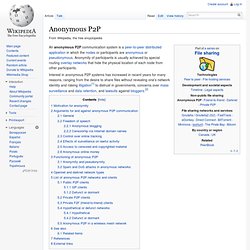
P2P users who desire anonymity usually do so as they do not wish to be identified as a publisher (sender), or reader (receiver), of information. Common reasons include: A particularly open view on legal and illegal content is given in The Philosophy Behind Freenet. Arguments for and against anonymous P2P communication[edit] General[edit] Some[who?]
Easily accessible anonymous P2P networks are seen by some as a democratization of encryption technology, giving the general populace access to secure communications channels already used by governments.